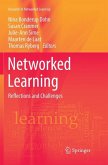Of all the topics of interest in the digital humanities, the network has received comparatively little attention. We live in a networked society: texts, sounds, ideas, people, consumerism, protest movements, politics, entertainment, academia, and other items circulate in and through networks that come together and break apart at various moments. In these interactions, data sets of all sorts are formed, or at the least, are latent. Such data affect what the humanities is or might be. While there exist networked spaces of interaction for digital humanities work, considering in more detail how networks affect traditional and future goals of humanistic inquiry is a timely pursuit. Networked Humanities: Within and Without the University takes up this issue as a volume of collected work that asks these questions: Have the humanities sufficiently addressed the ways its various forms of work, as networks, affect other networks, within and outside of the university? What might a networked digital humanities be, or what is it currently if it does, indeed, exist? Can an understanding of the humanities as a series of networks affect--positively or negatively--the ways publics perceive humanities research, pedagogy, and mission? In addressing these questions, Networked Humanities offers both a critical and timely contribution to the spacious present and potential future of the digital humanities, both within academe and beyond. Contributors include Neil Baird, Jenny Bay, Casey Boyle, James J. Brown, Jr., Levi R. Bryant, Naomi Clark, Bradley Dilger, Kristie S. Fleckenstein, Paul Gestwicki, Tarez Samra Graban, Jeffrey T. Grabill, Laurie Gries, Byron Hawk, John Jones, Nate Kreuter, Devoney Looser, Rudy McDaniel, Derek Mueller, Liza Potts, Jeff Pruchnic, Jim Ridolfo, Nathaniel Rivers, Jillian J. Sayre, Lars Söderlund, Clay Spinuzzi, and Kathleen Blake Yancey. About the Editors Jeff Rice is the Martha B Reynolds Professor of Writing, Rhetoric and Digital Studies at the University of Kentucky. He is the author of several books on writing, rhetoric, and new media. Brian McNely is Associate Professor of Writing, Rhetoric, and Digital Studies at the University of Kentucky. He studies everyday genres, technologies, objects, and practices of communication.








